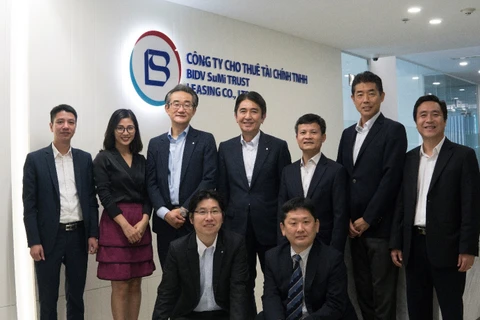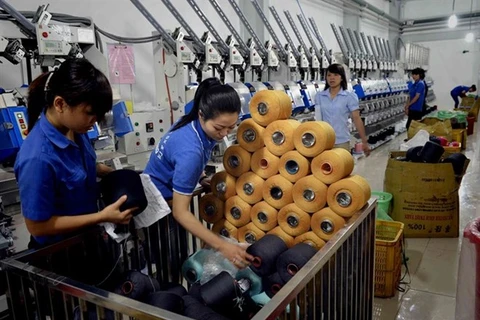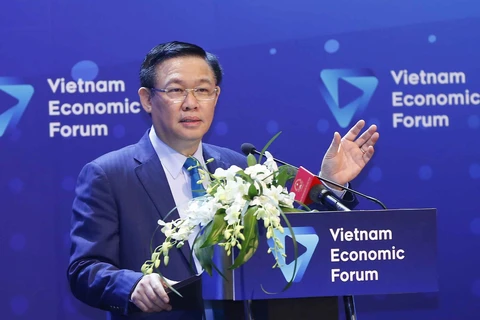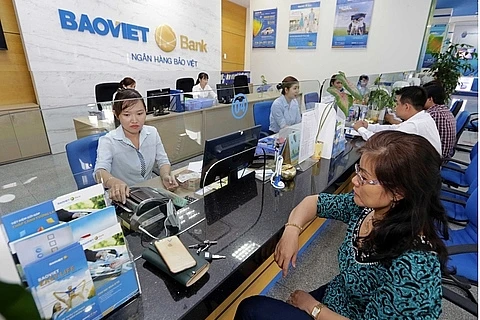 SHB has recently received a US$20 million loan from Russia’s International Investment Bank (Photo: SHB)
SHB has recently received a US$20 million loan from Russia’s International Investment Bank (Photo: SHB) Hanoi (VNS/VNA) - Struggling to attract domestic funds, banks are rushing to seek foreign capital ahead of the central bank’s tightened policy on medium- and long-term lending early next year.
According to the State Bank of Vietnam (SBV) regulations, short-term funds for medium- and long-term loans at banks will be reduced from the current 45 percent to 40 percent from January 1, 2019.
Banks will also need more capital to meet a capital adequacy ratio (CAR) of 8 percent in 2020 as per the SBV’s Basel II norms.
To prepare for the regulations, besides increasing interest rates for long-term deposits to attract depositors, banks also have to find capital from foreign partners.
Saigon Hanoi Commercial Joint Stock Bank (SHB) recently took a 20 million USD loan for a term of five years from Russia’s International Investment Bank and a 20 million EUR loan under a credit agreement framework with Russian International Bank for Economic Cooperation.
According to SHB, the loans will help the bank supplement its medium- and long-term capital funding for Vietnam’s infrastructure projects, and projects involved small and medium enterprises and green energy. The loans will also help SHB perform international payment transactions, trade finance, import-export transactions between IBEC member countries, foreign exchange activities and capital mobilisation.
Earlier, Lien Viet Post Commercial Joint Stock Bank (LienVietPostBank) also received a loan worth 50 million USD from JPMorgan Chase for a term of three years. This loan will help the bank supplement its medium- and long-term foreign capital source and meet the needs for foreign loans of domestic businesses.
Tien Phong Commercial Joint Stock Bank (TPBank) also signed a long-term loan contract worth up to 100 million USD with the International Finance Corporation (IFC). Along with financing, IFC will act as an advisor for TPBank in banking governance, risk management and development capacity building.
Orient Commercial Joint Stock Bank (OCB) is also expected to soon borrow foreign capital, as there is information that IFC is considering granting a loan of up to 100 million USD to the bank.
Besides foreign capital loans, banks also expect the Government to increase the foreign ownership ratio to meet their dire need of capital.
Under current regulations, the ownership ratio of a foreign investor in a Vietnamese bank can’t exceed 20 per cent of the bank’s charter capital and the total shareholding ratio of all foreign investors in the bank can’t exceed 30 percent.
According to banks, this is the biggest obstacle in attracting foreign capital and some banks have used up this limit. Therefore, many banks have asked the Government to increase the ratio to 49 percent to help them increase capital.
Experts have agreed with the proposal, saying banks need capital to operate more healthily and better serve society and the economy.
Financial expert Nguyen Tri Hieu said the Government and SBV should consider the banks’ proposal as the domestic capital market is very limited.
Due to the difficulties of the banking sector, domestic investors are no longer willing to invest capital, Hieu said, proposing the SBV allow foreign investors to invest in Vietnamese banks at a maximum level of 49 percent.
According to Hieu, the Government should not be concerned that foreign investors may manipulate the financial market because no country has seen a loss of control of the market due to foreign capital flow.
Agreeing, experts from Bao Viet Securities Company (BVSC) said that the increase of foreign ownership limit to 49 per cent is needed to help banks meet requirements in the country’s integration and be able to compete with international peers.
With the ratio increase, the State would still hold a dominant stake of 51 percent at banks and can also control banks through the Law of Credit Institutions and other legal regulations, BVSC experts said, adding the rise would not only help Vietnam meet commitments in joining the international economic integration but also attract large capital of foreign investors to local banks. – VNS/VNA
VNA
























